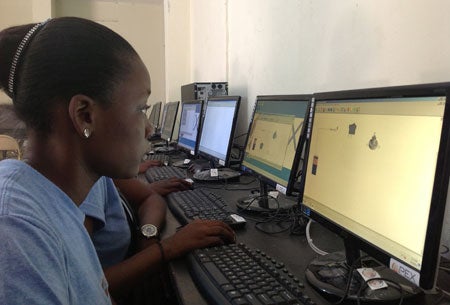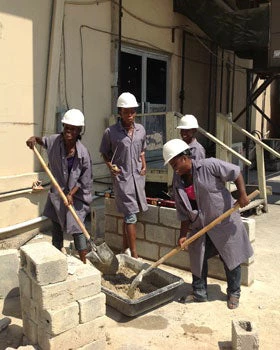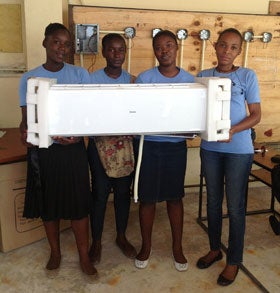Available in Español, Français
 For almost a year, the World Bank has been supporting the Adolescent Girls Initiative (AGI) in Haiti, where much of the country is still recovering from the 2010 earthquake. Through this program, 1,000 low-income Haitian girls between the ages of 17 and 20 who did not complete secondary school have been able to receive vocational and technical training in areas of work not traditionally open to women.
For almost a year, the World Bank has been supporting the Adolescent Girls Initiative (AGI) in Haiti, where much of the country is still recovering from the 2010 earthquake. Through this program, 1,000 low-income Haitian girls between the ages of 17 and 20 who did not complete secondary school have been able to receive vocational and technical training in areas of work not traditionally open to women.
The program seeks to ensure that these young Haitian women can enter the labor force with skills and experience. Internships are an integral component of the training they receive. In this context, the acquisition of technical skills suited to labor market needs and a change in mindset are critical to altering this situation in tangible ways.
I had the opportunity to go to Port-au-Prince when the program was launched and meet the future beneficiaries. I returned a few weeks ago to observe the progress made.
I met Nadine Napoléon at the offices of the Ministry of Women’s Affairs and Women’s Rights. She says this training is a source of hope. “Haitian women must realize that the sky is the limit. They must change their mindset.”
Is change possible? Rozanie Jean-Brice, her colleague, thinks so. She says women must be encouraged to perform different jobs, but awareness must first be raised among employers. Too often, employers prefer to choose a man over a woman when hiring. “Training and obtaining initial experience in a vocational field through an internship can help women break the glass ceiling.”This is especially true in a context where social relations play a decisive role in landing a first job—a situation that places young people at a disadvantage, since they do not have this social capital.
 Very few women work in the area of electrical and refrigeration systems installation, telecommunications, or even construction, where the wages are higher than in traditionally female-dominated jobs. Pierre Frandy is convinced that women “should specialize in technical jobs where they produce more” than men. He is a 32-year-old entrepreneur who returned from the Dominican Republic after the Haiti earthquake to help rebuild his country. He often invites young women to apply the skills acquired at Apex, an AGI partner training center, at the electricity and telecommunications installation work sites run by his company, Install & Repair. These mini-internships boost the employment prospects of young women who can present themselves to a prospective employer with practical experience. He hopes to have these internships become jobs if the economic situation permits.
Very few women work in the area of electrical and refrigeration systems installation, telecommunications, or even construction, where the wages are higher than in traditionally female-dominated jobs. Pierre Frandy is convinced that women “should specialize in technical jobs where they produce more” than men. He is a 32-year-old entrepreneur who returned from the Dominican Republic after the Haiti earthquake to help rebuild his country. He often invites young women to apply the skills acquired at Apex, an AGI partner training center, at the electricity and telecommunications installation work sites run by his company, Install & Repair. These mini-internships boost the employment prospects of young women who can present themselves to a prospective employer with practical experience. He hopes to have these internships become jobs if the economic situation permits.
An internship that provides initial professional experience

If management is aware of the benefits of employing women, then the buy-in of current employees must be obtained, particularly the reception given to those new to the workforce. Reginald Simon, one of the managers of the public works company Tecina S.A., and the Haiti Tec center have just reached an agreement on an internship program. Trained in the United States, he recognizes that the number of interns “is first and foremost contingent on the number of companies that decide to provide training. This is something that I cannot impose; it has to be voluntary.” When 25 to 30 percent of a company’s employees are female, he believes that the program is successful. “They are more professional and more disciplined. In addition, the presence of an intern is beneficial to our most experienced employees. They learn new technologies, now the norm in our jobs, from the young women who are hired.”
 Big companies like Digicel and smaller ones benefit from women trained by Apex and Haiti Tec. The training centers steer the young professionals toward microenterprises that have fewer than 10 salaried employees and are springing up all over Port-au-Prince. They are model enterprises that attract young women who are supported by the AGI. Jessica, who is being trained to install electrical and refrigeration systems, now believes that she is capable of creating her own company. This enthusiasm is shared by a group of young female construction workers learning about earthquake-resistant building at Haiti Tec. “We are the future of Haiti,” one tells me. As I watch them install a cinderblock wall, I don’t doubt her.
Big companies like Digicel and smaller ones benefit from women trained by Apex and Haiti Tec. The training centers steer the young professionals toward microenterprises that have fewer than 10 salaried employees and are springing up all over Port-au-Prince. They are model enterprises that attract young women who are supported by the AGI. Jessica, who is being trained to install electrical and refrigeration systems, now believes that she is capable of creating her own company. This enthusiasm is shared by a group of young female construction workers learning about earthquake-resistant building at Haiti Tec. “We are the future of Haiti,” one tells me. As I watch them install a cinderblock wall, I don’t doubt her.


Join the Conversation